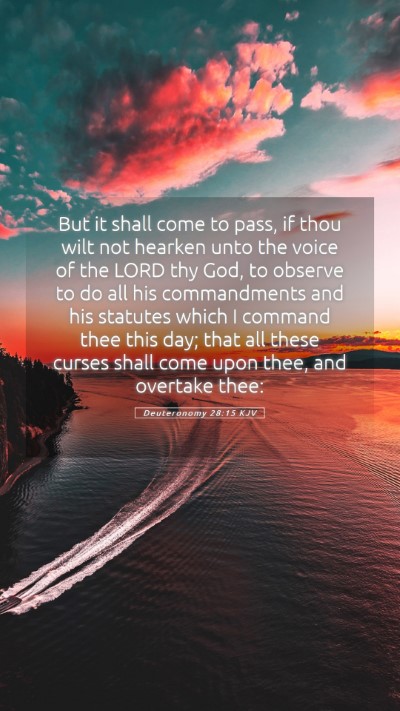Understanding Deuteronomy 28:15
Deuteronomy 28:15 states: "But if you do not obey the LORD your God and do not carefully follow all his commands and decrees I am giving you today, all these curses will come on you and overtake you."
This verse serves as a pivotal warning within the broader context of Deuteronomy, where Moses outlines the blessings and curses associated with Israel's fidelity to God.
Bible Verse Meanings and Interpretations
The verse acts as a contrast to the previous blessings listed in the earlier sections of the chapter. Here are some key points of interpretation:
-
Conditionality: The blessings of the covenant are inherently conditional. As noted by Matthew Henry, the verse underscores the principle that disobedience results in divine repercussions. This reflects a common theme in the Old Testament covenant relationship.
-
Impact of Disobedience: Albert Barnes emphasizes the severity of the “curses” that follow. The language used suggests that ignoring God's commandments does not simply lead to mild consequences but extreme repercussions that "overtake" the people, indicating they will be unavoidable.
-
Nature of God’s Commands: Adam Clarke points out that the commands mentioned are not arbitrary but important for the well-being and moral conduct of the community. Obedience to God is portrayed not just as a duty but as vital for maintaining societal health.
Scriptural Context and Historical Background
Understanding the historical backdrop enriches the meaning of this verse. At the time of Deuteronomy’s composition, the Israelites were on the cusp of entering the Promised Land. Moses, aware of the challenges they would face, earnestly cautions them about the consequences of their choices, framing obedience as the pathway to sustaining their covenant relationship with God.
Bible Verse Commentary and Exegesis
An in-depth biblical exegesis reveals that this verse functions within a comprehensive system of divine law. The blessings and curses (found in Chapters 28-30) offer a stark dichotomy between the consequences of obedience and disobedience.
Here are several focal points for deeper commentary on Deuteronomy 28:15:
-
The Role of Israel: The verse emphasizes Israel's role as a chosen people with a specific set of responsibilities whereby their survival and prosperity are connected to their fidelity to God.
-
Cursory Overview: As explored by Matthew Henry, the "curses" include various forms of societal breakdown, famine, defeat in battle, and exile—all rooted in the abandonment of God’s law.
-
Modern Application: The tumultuous repercussions outlined in the text may resonate with contemporary discussions on ethical living, suggesting that neglecting moral obligations can lead not only to personal calamities but also adversely affect communities.
Bible Study Insights
For those engaging in Bible study groups or seeking online Bible study resources, Deuteronomy 28:15 offers fertile ground for discussion. Here are a few study topics that could arise:
-
How to interpret Bible verses: Analyzing the conditional nature of God's promises and threats as presented in the Old Testament.
-
Understanding difficult Bible passages: Navigating the implications of divine curses and their relevancy today.
-
Historical context of Bible verses: Exploring the socio-political landscape of ancient Israel during the time of Moses.
Application of Bible Verses to Daily Life
Reflecting on Deuteronomy 28:15 invites believers to consider the profound impact of their choices. The applications could include:
- Recognizing that obedience to God's commands is integral to experiencing His favor.
- Understanding that the neglect of divine instructions can lead to detrimental outcomes, both personally and within a community.
- Cultivating a lifestyle that continually seeks a closer relationship with God through active obedience and moral living.
Related Bible Cross References
This verse connects to several cross-references that further illuminate the themes of obedience and divine judgment:
- Leviticus 26:14-16: Discusses curses that follow disobedience to God.
- Jeremiah 11:3: Highlights the consequences of failing to heed God's voice.
- Galatians 6:7: "A man reaps what he sows," emphasizing the principle of consequences tied to actions.
To summarize, Deuteronomy 28:15 serves as a critical reminder of the obligations that accompany the blessings of a covenant relationship with God. Through the lenses of various public domain commentaries, we glean insights that encourage comprehensive Bible study insights and deeper comprehension of scripture.


